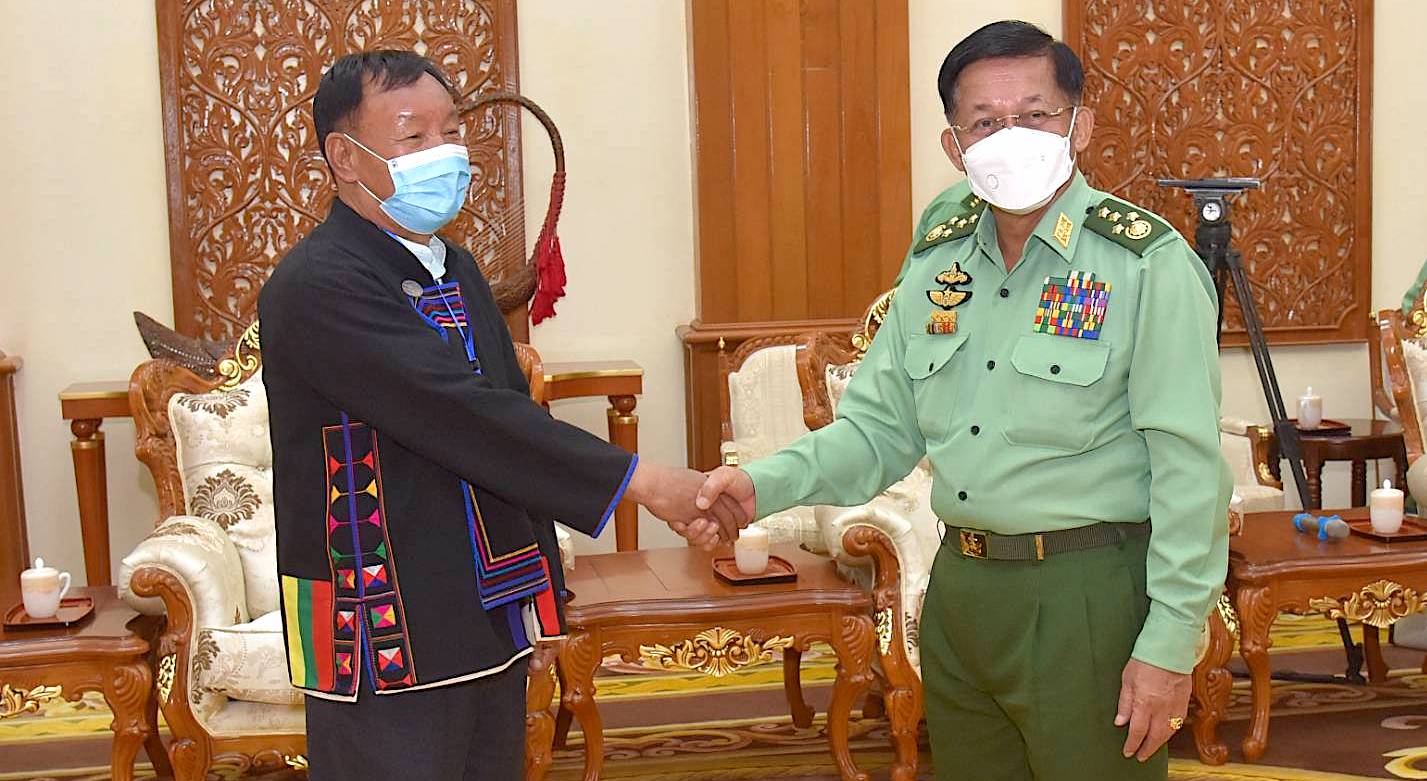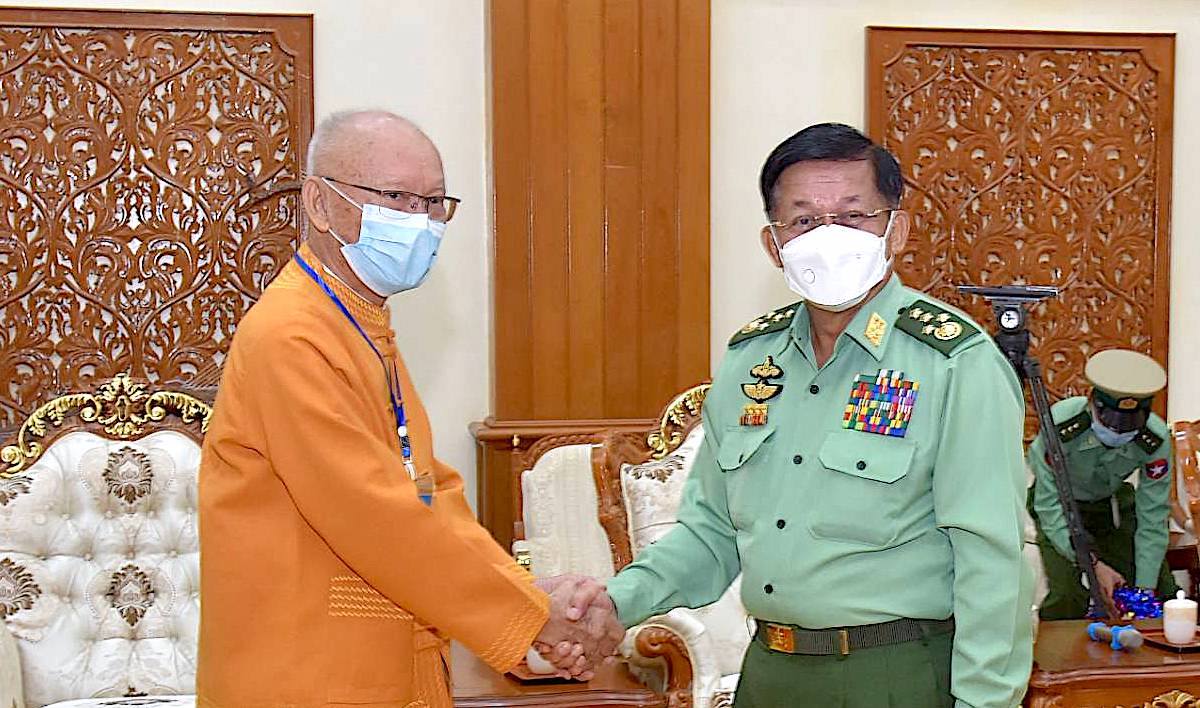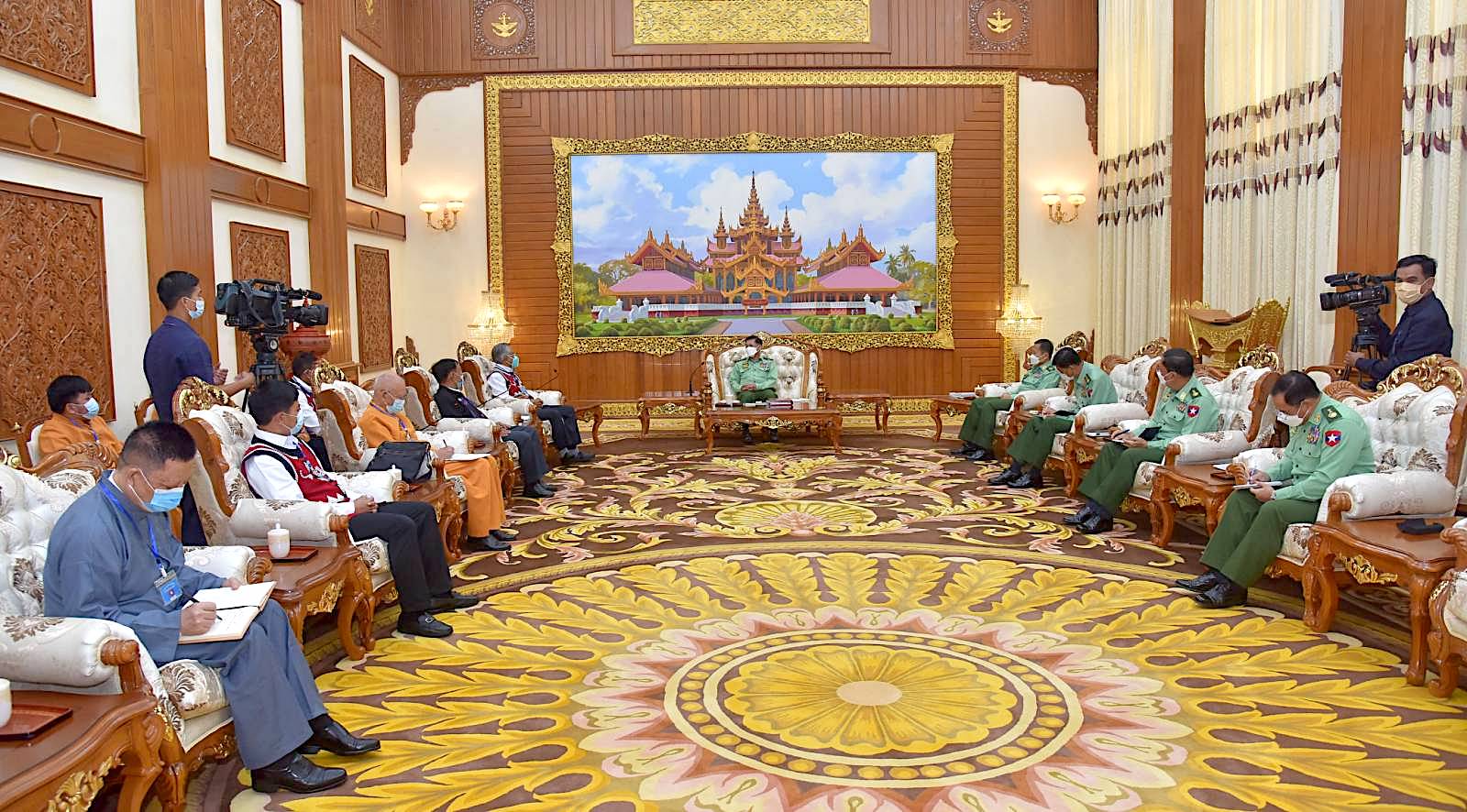Representatives of three powerful ethnic armed organizations (EAOs) based in eastern Myanmar — the United Wa State Army (UWSA), the National Democratic Alliance Army (NDAA) and the Shan State Progress Party (SSPP) — met junta chief Senior General Min Aung Hlaing on Monday for a second round of peace talks during which they pressed their demands.
The Irrawaddy takes a look at what the EAOs are asking for and the junta’s response.
SSPP proposes changes to army-drafted constitution
At the meeting, SSPP vice chair Sao Khun Hseng suggested a set of preconditions to build peace and establish a federal, democratic Union, according to a SSPP statement. Those preconditions included the implementation of provisions in the 1947 Panglong Agreement, as well as agreements reached at the 1961 Taunggyi Conference of non-Bamar ethnic delegates, and the establishment of a separate Bamar state aimed at establishing ethnic equality.
Sao Khun Hseng also suggested five amendments to the constitution, including a provision that “sovereignty of states, which are parts of the Union, is derived from people”. He also demanded that states must have absolute self-determination and must be politically equal, plus the sharing of power, resources and taxes and the implementation of a federal financial system.

All the security and defense forces of the Union must be under the control of the democratically-elected government, added Sao Khun Hseng.
Shan Nationalities League for Democracy general secretary Sai Leik said: “I think [the SSPP vice chair] mainly referred to articles 5 and 7 when he called for the implementation of Panglong. The agreement was signed by Shan, Chin, Kachin and Karenni [together with Bamar] to gain independence and build the Union together. According to those articles, citizens of the Frontier Areas shall enjoy rights and privileges which are regarded as fundamental in democratic countries, and full autonomy in internal administration for the Frontier Areas is accepted in principle. But I am sure that those provisions have never been implemented.”
UWSA repeats Wa demand for statehood
Newly-promoted Ai Nap Lai, head of the politburo of the United Wa State Party, the political wing of the UWSA, was part of the UWSA delegation that met the junta chief. Ai Nap Lai is a son of Zhao Nyi Lai, one of the founders of the UWSA.
UWSA liaison officer Nyi Rang based in Shan State’s Lashio said that the UWSA leaders mainly discussed development of their region at the talks.

“We mainly discussed regional development. Regarding your question of whether we discussed statehood, we have been demanding that for a long time. We will also meet the [regime’s] National Solidarity and Peacemaking Negotiation Committee,” he said.
Despite its absolute autonomy over areas known as Wa State in Shan State, the UWSA, the most powerful EAO in Myanmar, has demanded official statehood.
NDAA demands self-administered region
The NDAA, based in Mongla in eastern Shan State, demanded that the area it controls, which is known as Special Region 4, be designated as a self-administered region, according to sources close to the NDAA.
NDAA spokesman Kham Maung said: “The delegation has not yet arrived back and we don’t know yet what they discussed.”
Military regime media doesn’t report EAO demands
Junta-controlled newspapers contained only a few lines about what EAO representatives discussed with the coup leader, instead highlighting what Min Aung Hlaing said.
EAO leaders were overjoyed at the talks with the junta chief, promised not to secede from the Union and advised solving disagreements peacefully without the use of arms, said regime media.

The peace process will be implemented in line with the army-drafted 2008 Constitution and the Nationwide Ceasefire Agreement (NCA), added junta media.
The report was just an echo of the statement issued by the UWSA after the first round of talks with Min Aung Hlaing in May. In its statement, the UWSA promised not to secede from the Union, while asserting its right to determine the fate of Wa State, except in national defense and foreign relations. But the UWSA did not mention the NCA in its statement.
An ethnic affairs analyst who wished to remain anonymous said that Min Aung Hlaing met the EAOs not to listen to their demands, but to persuade them not to supply arms to the resistance groups fighting the regime.
“I think it will be difficult for the Myanmar military to prevent those groups from supplying arms to People’s Defense Forces (PDF). Although the groups may not publicly support the PDFs, they will surely supply them indirectly,” said the analyst.
Will regime fulfill EAO demands?
The SSPP’s demand is a reminder of the common desire of all the ethnic groups across the country, said the ethnic affairs analyst.
“To have a Bamar state is part of the Shan federal proposal also known as the Taunggyi proposal because it was adopted at the 1961 Taunggyi Conference. The main intention is that Bamar people must also have a state, only then will there be equality,” he said.
“Ethnic minorities are demanding a Bamar state because they will otherwise have to listen to the Bamar who make up the majority under the current system,” he added.
The analyst said: “It appears that the SSPP had already discussed its demands with the UWSA and NDAA before making its presentation to the junta chief. And I assume the UWSA and NDAA support those demands.”
The fact that the regime did not report the SSPP’s demands shows it [the junta] is opposed to the SSPP’s demands, noted another ethnic affairs analyst.
“The military is only thinking about how to buy time and is not interested in peace. So it is approaching the SSPP based on that, while the SSPP is fighting and negotiating at the same time,” he said.
Military tensions are running high between the regime and the SSPP with the two sides clashing earlier this month in Momeik Township in northern Shan State.

















